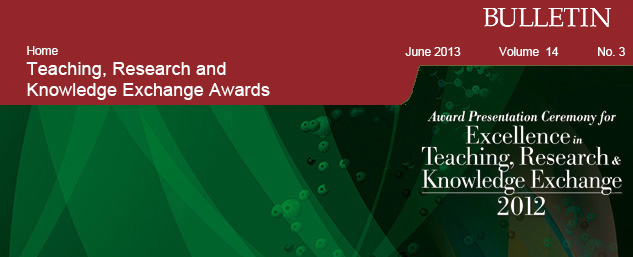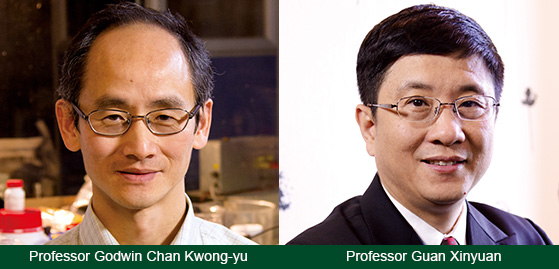| Scholars who produce exceptional research of international merit are honoured with this award, and receive $250,000 to further their research. |
| Outstanding Researcher Award |

|
|
Professor Godwin Chan Kwong-yu Department of ChemistryProfessor Chan is one of the top one per cent cited scientists in his field of electrochemistry, which involves converting chemical energy into electrical energy, and developing materials to promote electrochemical energy for a clean environment and for more efficient energy conversion. He has made significant contributions on multi-scale structured materials for applications in fuel cells and batteries, including five inventions in these areas, and he holds out hope that one day the discoveries in electrochemistry will make it possible to recharge equipment using a liquid such as alcohol. Professor Chan is also a pragmatist and he recognises such discoveries are rarely made by one individual. He therefore also puts effort into cultivating a new generation of researchers. “My work involves great challenges that cannot be fulfilled by a single person’s efforts, so I also hope I can make enough effort to trigger the interest of others, especially research students, and motivate them to continue to fulfill these dreams.” |
|
|
Professor Guan Xinyuan Department of Clinical OncologyAfter more than 25 years of research into cancer genetics, Professor Guan has made major contributions in the field including developing the micro-FISH technique, and the identification and characterisation of cancer-related genes and of cancer stem cells in hepatocellular carcinoma. He studied in the US for 11 years. “There they pay more attention to lung cancer, colon cancer and breast cancer – but in China, liver, esophageal and nasopharyngeal cancers are common, so that’s why I came back to Hong Kong to study and to try to identify the genes involved with the development of these cancers,” he said. His current research is focussed on cancer stem cells, cancer microenvironments, cancer metabolism and cancer-related genes in liver, esophageal and nasopharyngeal cancers. Professor Guan admits that cancer research is not an easy job, and that researchers frequently have to face failure. “Cancer is a very complicated disease, a very smart enemy,” he said. “Every time you think you can catch it, it finds other ways to escape.” But he is encouraged when other people recognise his work. “A lot of people cite our work in their papers, so our work is very meaningful to others.” – this gives him the confidence to continue to fight the enemy. |
|
| Back | Next |
